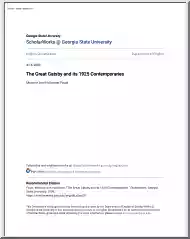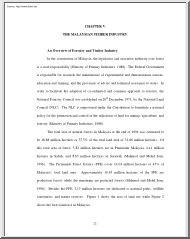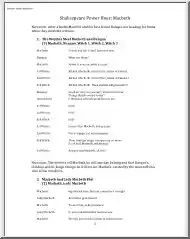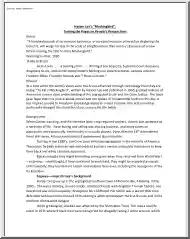Datasheet
Year, pagecount:2017, 5 page(s)
Language:English
Downloads:3
Uploaded:June 28, 2021
Size:734 KB
Institution:
-
Comments:
Attachment:-
Download in PDF:Please log in!
No comments yet. You can be the first!
What did others read after this?
Content extract
Romeo and Juliet Act Two (study guide) Explain the Prologue. ACT TWO - SCENE ONE: Explain the dramatic irony in this scene. The audience knows what Mercutio does not, that calling on Rosaline’s charms will no longer produce Romeo, who now loves Juliet. ACT TWO - SCENE TWO: (This is the most famous scene in the entire play.) 1. Fill in the blanks in this paraphrase of Romeos soliloquy (lines 1-32) Shh! What light is at the window? Juliet shines through the window like the sun rises in the east. Arise, beautiful sun (Juliet) and replace the moon who is jealous because you, her maid (Diana - Virgin moon goddess) are more fair than she. Dont be a servant since the moon is envious of you. Her innocence is sickly, and only a fool would keep it Oh! Its Juliet! I wish she knew that I love her. She speaks but says nothing. How strange She speaks with her eyes Ill answer her No, Id better not since she isnt aware I’m here. Two of the fairest stars in heaven have asked her eyes to twinkle
for them while they take care of some business. If her eyes were there, her eyes would make the stars seem dull just as daylight outshines a lamp. Her eyes would shine so brightly that the birds would think it were not night and begin to sing. O I wish that I could touch her cheek She speaks. 0 speak again bright angel, for you are as glorious to this night, being over my head (up at the window) as is an angel of heaven is to mortals who look up and see him when he walks on the clouds and sails on the air. 2. Explain Juliets soliloquy (lines 33-44) She is talking about how much she wishes Romeo did not belong to the family that is enemies with her family. 3. How is this an example of dramatic irony? The audience knows what Juliet does not – that Romeo is there and hears here. 4. Fill in the blanks in this paraphrase of Juliets speech (lines 35-106) You know it is dark or you could see me here because you heard me talking about you. If I followed proper etiquette, Id deny I ever
said it But who cares about etiquette! Do you love me? Dont say yes unless you really mean it. If you think that I am too bold 1ll play hard to get so you can win my affections. The truth is I am foolishly in love with you, and you might not take me seriously. But trust me, and Ill prove myself to be more true than those who know how to play hard to get. I would have been more distant I must confess, but since you allude me, let me confess my love for you, there is no other way to be. 5. After Romeo and Juliet vow their love for one another, what do they decide to do and when? They decide to get married the next day. ACT TWO - SCENE THREE This scene opens with Friar Laurence collecting herbs. He is discussing the properties of the herbs and the purposes for which they may be used. This demonstrates Friar Laurences knowledge of herbs and foreshadows that this knowledge may serve some purpose in future events in the drama. The sky turns light/grey as the night gives way to morning.
Streaks of light speckle the Eastern sky as the sun rises in its normal course. Now, before the sun rises fully and dries the dew, I must fill this willow basket with weeds and flowers. The earth is both the place of birth and death for all of nature. We find all kinds of plants growing from the earth; Some are good and some bad, but all are valuable. Plants and herbs and stones have great qualities/value. There is nothing on earth so bad that it does not have some good qualities, and nothing so good that it cannot be used for bad. Even goodness itself turns to vice when misused, and vice put to good use may appear worthy. Within this tiny bud lies poison as well as medicine; for it has a very pleasing smell, but if you taste it, it will kill you. It is the same with man He is part good and part evil, and when the bad side of his nature is stronger than the good, hell sooner or later kill himself. 2. Why does Romeo go to see Friar Laurence? To ask him to marry him and Juliet. 3. How
does Friar Laurence respond to Romeos request? At first he is confused and uncertain because Romeo had so recently been so unhappy about Rosaline, but he is convinced of Romeo’s love for Juliet and agrees. 4. Why does Friar Laurence consent to Romeos request? He hopes their marriage will end the Montague/Capulet feud. ACT TWO - SCENE FOUR This scene serves as a contrast to the preceding scene in Friar Laurences cell. Mercutio and Benvolio are in a merry mood as they walk along talking and laughing about Romeo whom they think is still pining away over Rosaline. Benvolio mentions that Tybalt has sent a challenge to Romeo. Mercutio then gives a long description of Tybalts eagerness to fight. Romeo comes along in a good mood after his talk with Friar Laurence. They engage in a series of puns matching their wits against each other. Along comes Juliets nurse and Peter (her servant) 1. For whom is the nurse looking and why? She is looking for Romeo to give him a message from Juliet. 2.
What warning does she give Romeo? She warns him that there will be trouble if he hurts Juliet. ACT TWO - SCENE FIVE Juliet is waiting very impatiently for the nurses return. Why does she become so irritated when the nurse does return? The nurse keeps stalling before telling her what Romeo said. ACT TWO - SCENE SIX Romeo and Juliet are married in Friar Laurences cell. How does this scene foreshadow future events? The Friar wans against haste and says they should love moderately. General - Find one example in Act Two of each of the following literary devices: 1. Conceit 6. Simile 2. Personification 7. Dramatic Irony 3. Hyperbole 8. Paradox 4. Pun 9. Apostrophe 5. Metaphor 10. Allusion 1. Conceit – Mercutio believing he can “conjure” Romeo Also, pg 524, line 30 (Juliet speaking). 2. Personification – Comparing Juliet with angels, pg 508, line 25 3. Hyperbole – Pg 513, line 170 – “I will not fail, ‘is 20 years til then” (Actually it is the next day). 4. Pun –
Line 33 – roe = fisheggs, but here it is a possible pun on the name Romeo 5. Metaphor – Arise fair sun (Juliet) and kill the moon (Rosaline) – Pg 508, line 4 6. Simile – Pg 524, line 15 – Too swift arrives as tardy as too slow 7. Dramatic Irony – Pg 517, Line 12 – Although Mercutio does not know it, Romeo is in fact all the things that Mercutio jestingly accuses him of being. The irony lies not only in the mention of being “already dead” but also in the fact that Romeo is in love, but with a different woman. It is also ironic that Mercutio claims Romeo is no match for Tybalt; Romeo will kill Tybalt after Tybalt has killed Mercutio. 8. Paradox – When Friar Laurence is comparing something being medicinal (good), while at the same time poisonous (deadly). 9. Apostrophe (like an aside) – Page 508, line 37 – Romeo (aside) Shall I hear more, or shall I speak at this? 10. Allusion – Page 517, lines 33 – 39 Shakespeare here praises Petrarch, a poet who had an
enormous influence on Elizabethan writers. Mercutio says Laura had a better poet to write poems to her – that is, Petrarch was a better poet than Romeo is
for them while they take care of some business. If her eyes were there, her eyes would make the stars seem dull just as daylight outshines a lamp. Her eyes would shine so brightly that the birds would think it were not night and begin to sing. O I wish that I could touch her cheek She speaks. 0 speak again bright angel, for you are as glorious to this night, being over my head (up at the window) as is an angel of heaven is to mortals who look up and see him when he walks on the clouds and sails on the air. 2. Explain Juliets soliloquy (lines 33-44) She is talking about how much she wishes Romeo did not belong to the family that is enemies with her family. 3. How is this an example of dramatic irony? The audience knows what Juliet does not – that Romeo is there and hears here. 4. Fill in the blanks in this paraphrase of Juliets speech (lines 35-106) You know it is dark or you could see me here because you heard me talking about you. If I followed proper etiquette, Id deny I ever
said it But who cares about etiquette! Do you love me? Dont say yes unless you really mean it. If you think that I am too bold 1ll play hard to get so you can win my affections. The truth is I am foolishly in love with you, and you might not take me seriously. But trust me, and Ill prove myself to be more true than those who know how to play hard to get. I would have been more distant I must confess, but since you allude me, let me confess my love for you, there is no other way to be. 5. After Romeo and Juliet vow their love for one another, what do they decide to do and when? They decide to get married the next day. ACT TWO - SCENE THREE This scene opens with Friar Laurence collecting herbs. He is discussing the properties of the herbs and the purposes for which they may be used. This demonstrates Friar Laurences knowledge of herbs and foreshadows that this knowledge may serve some purpose in future events in the drama. The sky turns light/grey as the night gives way to morning.
Streaks of light speckle the Eastern sky as the sun rises in its normal course. Now, before the sun rises fully and dries the dew, I must fill this willow basket with weeds and flowers. The earth is both the place of birth and death for all of nature. We find all kinds of plants growing from the earth; Some are good and some bad, but all are valuable. Plants and herbs and stones have great qualities/value. There is nothing on earth so bad that it does not have some good qualities, and nothing so good that it cannot be used for bad. Even goodness itself turns to vice when misused, and vice put to good use may appear worthy. Within this tiny bud lies poison as well as medicine; for it has a very pleasing smell, but if you taste it, it will kill you. It is the same with man He is part good and part evil, and when the bad side of his nature is stronger than the good, hell sooner or later kill himself. 2. Why does Romeo go to see Friar Laurence? To ask him to marry him and Juliet. 3. How
does Friar Laurence respond to Romeos request? At first he is confused and uncertain because Romeo had so recently been so unhappy about Rosaline, but he is convinced of Romeo’s love for Juliet and agrees. 4. Why does Friar Laurence consent to Romeos request? He hopes their marriage will end the Montague/Capulet feud. ACT TWO - SCENE FOUR This scene serves as a contrast to the preceding scene in Friar Laurences cell. Mercutio and Benvolio are in a merry mood as they walk along talking and laughing about Romeo whom they think is still pining away over Rosaline. Benvolio mentions that Tybalt has sent a challenge to Romeo. Mercutio then gives a long description of Tybalts eagerness to fight. Romeo comes along in a good mood after his talk with Friar Laurence. They engage in a series of puns matching their wits against each other. Along comes Juliets nurse and Peter (her servant) 1. For whom is the nurse looking and why? She is looking for Romeo to give him a message from Juliet. 2.
What warning does she give Romeo? She warns him that there will be trouble if he hurts Juliet. ACT TWO - SCENE FIVE Juliet is waiting very impatiently for the nurses return. Why does she become so irritated when the nurse does return? The nurse keeps stalling before telling her what Romeo said. ACT TWO - SCENE SIX Romeo and Juliet are married in Friar Laurences cell. How does this scene foreshadow future events? The Friar wans against haste and says they should love moderately. General - Find one example in Act Two of each of the following literary devices: 1. Conceit 6. Simile 2. Personification 7. Dramatic Irony 3. Hyperbole 8. Paradox 4. Pun 9. Apostrophe 5. Metaphor 10. Allusion 1. Conceit – Mercutio believing he can “conjure” Romeo Also, pg 524, line 30 (Juliet speaking). 2. Personification – Comparing Juliet with angels, pg 508, line 25 3. Hyperbole – Pg 513, line 170 – “I will not fail, ‘is 20 years til then” (Actually it is the next day). 4. Pun –
Line 33 – roe = fisheggs, but here it is a possible pun on the name Romeo 5. Metaphor – Arise fair sun (Juliet) and kill the moon (Rosaline) – Pg 508, line 4 6. Simile – Pg 524, line 15 – Too swift arrives as tardy as too slow 7. Dramatic Irony – Pg 517, Line 12 – Although Mercutio does not know it, Romeo is in fact all the things that Mercutio jestingly accuses him of being. The irony lies not only in the mention of being “already dead” but also in the fact that Romeo is in love, but with a different woman. It is also ironic that Mercutio claims Romeo is no match for Tybalt; Romeo will kill Tybalt after Tybalt has killed Mercutio. 8. Paradox – When Friar Laurence is comparing something being medicinal (good), while at the same time poisonous (deadly). 9. Apostrophe (like an aside) – Page 508, line 37 – Romeo (aside) Shall I hear more, or shall I speak at this? 10. Allusion – Page 517, lines 33 – 39 Shakespeare here praises Petrarch, a poet who had an
enormous influence on Elizabethan writers. Mercutio says Laura had a better poet to write poems to her – that is, Petrarch was a better poet than Romeo is




